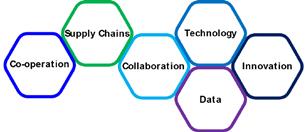
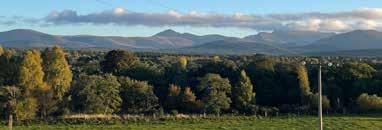



Political manifestos are often derided as being glossy publications full of empty promises and little more than ‘a bunch of words’. And in many cases that may well be a reasonable perspective. Earlier this summer however, I had the privilege of representing SAOS and our member co-ops at an industry event at 10 Downing Street. This wasn’t an excuse for a nosey around the halls of power, but to join representatives from a wide variety of sectors to celebrate the launch of the UK Government’s new Mutual and Co-operative Sector Business Council.
The Council has been set up as part of the Labour Party’s manifesto pledge, aiming to double the size of the UK’s co-operative and mutuals sector, and working with the sector to address the barriers they face. The premise of the Council is to bring together some of the leading mutual and co-operative businesses in the UK, to partner with government and help them achieve their manifesto aim. SAOS can feed into this forum via our

membership of Co-operatives UK and, bilaterally, with the Council’s agriculture representative, Arla UK. This renewed UK Government interest in co-ops is not only very welcome, but also timely as we have just finalised the new SAOS Business Strategy for 2026-2030. In creating this, we’ve gone ‘back to basics’ to ensure that our strategic plans remain firmly underpinned by the rationale that greater cooperation in our sector will help:
• Maintain a critical base for food production as well as our rural fabric, with family farms at its core
• Increase individual farm and agricultural sector profitability
• Provide a means to derisk and diversify farming sectors.
Similarly, whilst we’ve been around now for 120 years, our underlying purpose remains the same: “to promote, support and develop co-operation within agriculture, to maximise the economic, environmental and social benefits of working together”.
Our vision for 2030 is not just to see our sector treading water and surviving, but for it to thrive and grow. As such, our strategy aligns well with the UK Government’s commitment to support the growth of the co-op sector as a whole. But how will we secure that vision?
The plan will be driven by three key missions. First, and overarching, to help our co-op members become more resilient; strengthening their foundations and viability through helping reduce ‘key person’ risk, developing in-business capabilities, enhancing business governance
and helping to identify and reduce business risks.
Secondly, we want to enable growth through increasing relevant market knowledge, supporting innovation and increasing commercial capabilities. We want to catalyse commercial opportunities through provision of seed funding and build greater knowledge of fundraising opportunities and alternative business models. We also want to build greater ‘co-op to co-op’ collaboration and advantage.
Thirdly, we want to enable the fast-tracking of more cooperation by increasing coop business knowledge, and enhancing support for members to develop their own marketing and communications. We will complement this with continued activity for co-op-supportive public policy and extending stakeholder understanding and promotion for co-ops.
To deliver the above, we need to develop our own capabilities and resources, including developing and growing our diversified income streams to deliver more, better and quicker, for our members and for the wider sector.
It is essential that strategies, like manifestos, are explicit in their intentions and focus, but also in demonstrating their success in delivering. Whilst we live in an increasingly unpredictable world, and some of our ultimate success will be dependent on others, we do at least live by the enduring co-operative value of self-help and do not rely on governments, or their manifestos, for all our answers!
The last few months have seen an unprecedented number of changes and developments within our membership, with changes in leadership, new co-ops and mergers, all pointing to progress and positivity. Many of these are covered in the following pages.
As usual after the AGM, SAOS has had a partial changing of the guard. Coming to the end of their term on our Council were Anne Rae Macdonald, Peter Chapman and Dave Bell. We thank them all for their time and valuable input. Nearing the end of her term on the ANM Group Board, Jane Mitchell has made the decision to step down from the SAOS Board.
We are very grateful to Jane for all her time, support and wise council over the five years she has been on our Board.
Our newly elected Council members are Steven MacPhail of Lewis Crofters, Russell Brown of the Scottish Potato Co-op, Graham Bruce of Ringlink Scotland Ltd and Jonny Williams of Farm Stock Scotland. We look forward to working with them more closely.
Rory Christie (Chair)
Andy McGowan (Vice Chair)
Tom Pate
Murray Forsyth
Milk Suppliers Association
Scottish Pig Producers
Scottish Agronomy
Aberdeen Grain
Tim Bailey SAOS
David Kilshaw
Marion Mccormich
Euan Warnock
Senior Independent Director
Independent Director
Independent Director
The SAOS Council comprises our Board members, plus:
Michael Bayne
Richard Butterworth
Angela Porchez
Teresa Dougall
Rob Mitchell
Rod Sanderson
Borders Machinery Ring
Scotlean Pigs Ltd
Angus Growers
Scottish Quality Crops
Scottish Shellfish
Tarff Valley
Graham Bruce Ringlink
Scott Calderwood
Steven MacPhail
Russell Brown
Jonny Williams
Amanda Brown
Carol McLaren
Liz Barron-Majerik
Sarah Millar
Penny Montgomerie
Ruth Taylor
John Davidson
Patrick Hughes
First Milk
Lewis Crofters
Scottish Potato Co-op
Farm Stock Scotland
Scotland Food & Drink
RSABI
Lantra Scotland
QMS
SAYFC
WWF Scotland
NFU Scotland
SAOS
Thank you to everyone who took part in our 2024/25 training programme. With strong demand and several sell-outs, we supported co-op staff and boards across Scotland to develop practical skills – from negotiation and dispute resolution to communications and cyber security. Your feedback was clear: the sessions were engaging, relevant and well delivered.
Looking ahead to our Autumn/ Winter Programme, we’re building on momentum with a refreshed programme designed to help co-ops and rural businesses navigate change with confidence.
Coming Up Soon:
• Planning to Succeed – Your Path to Overcoming Employment Challenges (three part in-person series) – details to follow
• Effective Co-op Management for Directors – Nov 2025 (one day online)
• Co-op Management in Practice (CMiP) 18th&19th Feb 2026 (two days in-person)
• Refresh Your Company Secretary Skills
Jan 2026 (three-part online series)
• Negotiation and Dispute ResolutionMarch 2026 (one day in person)
To find out more or register your interest in upcoming training, contact Allison.watson@saos.coop
New to our programme is a focus on Artificial Intelligence and its practical benefits for farming, food and drink: Chat GPT and the Rise of AI
Dates: Thursday 30th Oct & 6th Nov
Format: Two half day online workshops (delivered via Zoom)
Workshop Leader: Gary Ennis, Managing Director, NS Design – an experienced and highly engaging trainer known to many from our social media and cyber security sessions.
Who should attend?
Managers, directors and teams across co-ops and rural businesses – especially those in marketing, business development/innovation, and leadership. Educators interested in AI’s impact on learning are also welcome.
What you’ll learn:
• What is Artificial Intelligence?
• Tools you can use right now (e.g. Chat GPT, Copilot, Midjourney
• Automating digital content creation for blogs, social media, PR and more
• Using AI for strategy, customer profiling and everyday efficiency
• Risks, pros/cons and ethical considerations
• AI in learning: ban or embrace it!
You’ll leave with practical, readyto-use techniques and examples
– covering graphics and video creation (e.g. Canva, Adobe Firefly, D-ID) and text generation for funding applications, member newsletter, social posts and campaigns.
Book your place: https://app.tickettailor.com/events/saos/1823939
The Small Producers Pilot Fund, the Scottish government initiative aimed at strengthening small producers and local food supply chains, has awarded more than £300,000 in grants to private kill abattoirs across the country.
In 2023, with support from Scottish Government and Fife council, SAOS conducted a survey on Abattoir Access. Over 550 responses demonstrated the many difficulties farmers and crofters have in accessing private kill services, with distance, availability and timings being most the most common responses.
Alongside this, SAOS held interviews with all the existing abattoirs servicing private kill. These interviews revealed the vulnerable financial position of many of the facilities and the challenges they face in servicing the private kill market, including small batches, uniformity of livestock, and producer needs.
SAOS’s Fergus Younger, who has been closely involved in the Small Producers Pilot Fund work explains: “Despite calls from many producers for new facilities in different regions, the work highlighted the challenging position that many existing facilities face, and that the initial effort needed to be focussed on support to prevent further contraction of the private kill abattoirs.
“With guidance from a dedicated steering group, SAOS worked with many of the existing abattoirs to develop approaches that could help them sustain their private kill offering and strengthen their businesses for the future. Alongside this, a funding grant of £36,000 to Quality Meat Scotland has supported the appointment of a dedicated national private slaughter co-ordinator, helping address operational challenges and with a focus on improving access to services and communications.
Rural affairs secretary Mairi Gougeon said that private abattoirs are essential to a thriving food supply chain, providing high quality, accessible services that ensure longterm viability for small producers:

“We remain firmly committed to supporting small producers and empowering them to play a key role in making our Vision for Agriculture a reality. That’s why the Scottish Government is investing up to £1 million this year through our Small Producer Pilot Fund to support innovation, resilience, and growth across the sector - including private kill abattoirs.”
Mull Slaughterhouse received a grant of £45,000. Their chair, Flora Corbett, commented: “Without this funding, throughput alone would not cover overheads, and we risk losing a service that underpins local food production. Having a functioning abattoir is essential for crofters and small producers who need traceability, humane slaughter close to home, and the ability to add value to their produce.
“Running an abattoir on an island comes with high costs, seasonal fluctuations, and staffing challenges. This support gives us the stability to build on what we’ve achieved - improving co-ordination and services, and helping more producers bring local meat to market.”
The Scottish government will continue to accept grant applications from private kill abattoirs, supporting rural and island communities to maintain vital food production infrastructure.
Last year’s report issued by SAOS following the initial Abattoir Access survey is available at: www.saos.coop/whats-new/news/abattoir-survey-results
We have another farewell this issue. Sadly, Anna Delday (Robertson as was) made the tough decision that commitments including taking on a new larger farm, must take precedence for now, and she has decided not to return to SAOS after her maternity leave. Anna has been with us for 15 years, having initially cut her teeth in the ScotEID team before moving over to SAOS, and she will be greatly missed by the whole wider team and, we’re sure, by our Members. Anna has been an exceptionally valuable member of the team with bundles of enthusiasm, a great manner, can do attitude, dedication to members, all on top of invaluable practical farming knowledge.
We’ll of course be keeping in touch with Anna and wish her and the family all the best with the new farm.

SAOS has appointed two new Co-op Development Managers, further strengthening our expertise and capacity in cooperative development.
Robert Logan, our Head of Co-operative Development said: “We are delighted to confirm that Claire Dyce and Adam Forrest will be joining SAOS. Both are well known to us with several of the team having worked with them previously, I am sure they will be a great fit for the team. Appointing the best people means we’re investing in SAOS’s future, developing and supporting our members and the delivery of SAOS’s ambitious plans for shaping the future of farming and food.”
Claire Dyce joined SAOS in August from one of our most innovative
members, Grampian Growers, where she worked for over ten years, most recently as New Business Development Manager, leading on various Research and Development projects. Additionally, Claire managed the co-op’s cut daffodil division. She also led the Next Generation Group and is Chair of the Flowers Grown in Scotland group, as well as being the most recent winner of the SAOS Next Generation Award. Claire is a graduate of St Mary’s University, Halifax, Canada, having completed their highlyregarded Certificate in Co-operative Management, and brings that wider co-op learning in addition to practical co-op business experience and project management skills.

Claire commented: “I am thrilled to be joining SAOS and look orward to applying my experience in co-op development and project delivery, to help drive meaningful progress in Scottish agriculture through co-operation. I’m looking forward to building strong relationships to support the team and members in delivering innovative activities that generate lasting benefits for co-ops.”
Adam Forrest will join the team in October. Most recently, Adam has been Scotland Manager for the Nature Friendly Farming Network, where he has led on strategy, stakeholder engagement and national representation. Prior to this, he was Organics Development Manager at Scotland Food & Drink, successfully advocating for, and helping shape, Scotland’s new Organic Action Plan. In these roles, he has shown the ability to build trusted relationships and mobilise networks to deliver strategic outcomes. Adam’s background is in rural and business development, and he also brings valuable experience in policy development, industry engagement and commercial strategy.
Adam told us: “I’m excited to be joining SAOS. I believe the organisation plays a unique role in helping farmers work together to innovate and thrive. Co-operation is one of the most powerful tools we have for building a fairer, more resilient rural economy so I’m looking forward to supporting co-ops that are already doing great work and helping with the groundwork for new ones to emerge and succeed.”
We are sure that members will join us in welcoming them both onboard!

The latest in the series of Co-op Member Videos we’re producing as part of the International Year of Co-operatives features Grampian Growers. You can watch it and others on our YouTube Channel at: https://youtu.be/FQJ_mHiNJlY
Please subscribe to the channel to ensure you don’t miss any!

Our GTL cohort for 25/26 is now finalised and the group will shortly be starting this year’s programme and exploring new ways of thinking and doing to help them develop and gain confidence in their own leadership styles.
This year’s intake list has, for the first time, more male than female participants.
Emma Koubayssi, who is the key point of contact for the GTL programme told us: “We had really strong interest in the programme this time, and we were oversubscribed for the programme which we deliberately keep to a small number to maximise
benefit. As a result of this, we are looking into the possibility of creating a Growing Leaders Series.”
“This is the first year we’ve had more men apply than women, which is interesting. I think this clearly reflects the programme’s growing credibility and it’s great news that men are being more open to professional and personal development opportunities.
“Thanks to everyone who has helped support and share news about the programme. If you have any questions at all, please just let me know.”
Find out more about developing your own or your staff’s leadership potential, and register interest for next time, at:
https://saos.coop/events-and-training/growing-tomorrows-leaders/
A pioneering project underway in the East Neuk of Fife is bringing together farmers, land managers, communities, and other partners to help restore nature and diversify farm income.
The groundbreaking initiative will establish a regional supplier of adapted Biodiversity Net Gain (BNG) credits and carbon credits, aiming to stimulate local investment in nature restoration that benefits local communities, encourages the development of blue/green businesses, and supports a transition to regenerative farming practices.
Central to the project, is the recent development and feasibility testing of a ‘Fife Environment Bank’, led by Fife Coast and Countryside Trust, with support from FIRNS (Facility for Investment Ready Nature Scotland) and managed by NatureScot.
The Fife Environment Bank represents a major opportunity to implement Scotland’s environmental strategy at a regional, farmer and land manager level, and supports the objectives of the recent Agricultural and Rural Communities Act; Natural Capital Market Framework;, National Planning Framework 4, and the Climate Fife Strategy and Action Plan. A
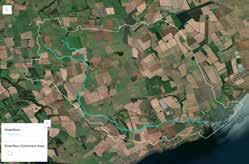
key feature of the bank will be its ability to offer upfront capital to farmers and land managers, removing a significant financial barrier to entry for habitat creation and carbon mitigation projects.
At the same time, a group of farmers in the Dreel Burn catchment area are exploring forming a natural capital producers’ co-operative, through which they can connect parcels of land, share risks, and reach the scale often necessary to access nature finance markets.
Although many individual holdings in the East Neuk are quite large, they are frequently divided across several parcels, making it hard to meet the usual 500acre connected land requirement alone. A co-operative approach addresses this, allowing farmers to maintain food production while generating new income
from using marginal land for habitat restoration, adopting regenerative practices, and building climate resilience.
Douglas Bowden-Smith, SAOS Project Manager, commented: “For 120 years, SAOS has supported co-operation in Scottish agriculture, and it’s great to see the growing number of farmers in the Dreel Burn catchment now recognising the value of working together and exploring the formation of a co-operative to access natural capital markets.
“We’re supporting the twenty farmers who have expressed interest, evaluating co-operative options and conducting a supply chain analysis, helping ensure that the venture is farmer-led and practical, while also offering broader benefits to communities, government, and society.
“Comparable initiatives in England, such as the Environmental Farmers Group and the North East Cotswolds Farmer Cluster, illustrate how collaborative, landscapescale approaches can deliver both environmental and economic benefits, supported by a combination of private and public funding.”
Our Strategic Services Director, Patrick Hughes, attended the Co-ops Congress in Manchester in July - which saw visitors from the International Cooperative Alliance (ICA) join UK delegates to explore, learn and celebrate how ‘co-ops build a better world’.
“In her opening address, Co-operatives UK CEO Rose Marley made references to the Rochdale Pioneers, describing their fight to provide good-quality, non-adulterated food. “Building a better world demands more than good intentions; it demands courage.”
There are 260 registered co-ops in Greater Manchester alone, spanning sectors from housing to the arts. The lack of agricultural or food producing co-ops in attendance was notable though, with the congress programme firmly prioritising social benefit and economic activity.
Congress delegates heard from economics and politics columnist and author, Grace Blakely, who delivered a speech on the current political context; at a time when trust in political parties is at an all-time low (9%) and one in five people are living in poverty, she believes that co-ops can be used to address the sense of powerlessness fuelling a “deep crisis of despair” in the UK.

She suggested that co-operating is a powerful way to get empowerment back and used Finland as an example where approximately 80% of the population are members of at least one co-operative.“Nobody is coming to save us... but we know that when we work together, we are capable of saving ourselves,” she said.
Grace’s comments were echoed by actor Steve Coogan, who is involved in a project in Greater Manchester working across housing, energy, digital and the arts. “You can’t change the world, but you can affect change at the local level.” he said.
Throughout the two-day Congress there were many examples of communities co-operating to empower themselves, including Community Clothing, a social enterprise established by the Great British Sewing Bee presenter, Patrick Grant. Set up in 2016, Community Clothing is a sustainable clothing brand that aims to make long-lasting clothing items rather than fast-fashion. Starting with one factory in Blackburn, it now works with 54 UK factories. Its main objective, says Grant, is to provide quality jobs.
Having moved into the second half of the International Year of Co-operatives, the Co-ops Congress was a welcome reminder of how co-ops in the UK and across the globe are trying to build a better world. One of my take home messages was that co-ops should shout louder about the long-term solutions they provide, to ensure their voices are heard at Government level and across every community in the UK. This year SAOS celebrates its 120th anniversary and although the wording may have changed over time, our vision for wider realisation of the advantage created through co-operation, with trusted and resilient agri co-ops delivering realterms growth within a vibrant rural economy, remains to this day.”
We’re excited to announce a new staff development group, providing an opportunity for enthusiastic, go-ahead, coop staff to meet like-minded peers, receive development training and SAOS support to develop ideas that can benefit their co-ops. We’re bringing together a group who will:
• Visit other co-ops to see how they do things and meet the people working there.
• Learn something new. With a short training or information sharing session from SAOS, and the opportunity to learn from different sectors.
• Build their network By meeting other co-op professionals and SAOS staff.
• Share their ideas about how to do the day-job better. To address challenges or make the most of opportunities.
can be a challenge. We think that by bringing enthusiastic and innovative people together we can help develop and motivate them. This will help keep good staff in co-ops and support their development.

• Get the opportunity to develop their ideas further, with a group of others with similar issues. We know staff recruitment, retention, and development

Launching Autumn 2025!
SAOS wants to use this initiative to turn their ideas into reality, whether it’s an improvement to things done on a day-to-day basis, or getting some funding to develop an idea further, or even getting a big research grant to investigate a new commercial opportunity. We’ve done all these things with co-ops in the past and want to do a lot more!
We expect the commitment to be around four days commitment each year, including a couple of day trips to co-ops. This is a funded initiative, so the only costs will be staff time and travel to meetings. We are looking to host our first session on the 29th of October. Get in touch with jim.booth@saos.coop
This year’s Nuffield Conference takes place in Aberdeen from 18-20th November and our very own Nuffield Scholar, Emma Patterson Taylor, will be presenting as part of the event.
Emma’s scholarship, sponsored by The Royal Highland and Agricultural Society, explores “The position of farming in the public consciousness” and the relationship between consumers and the food they choose to eat. She also looks at the industry’s response to challenges and opportunities; the growing concern around climate change; animal welfare and human health issues leading to a rise in the interest of veganism; and the increasing disconnect between primary food production and consumers being observed, particularly in millennials in urban populations.

Emma told us: “The widely perpetrated negatives around the role of livestock farming in the 21st Century needs to be fully understood. My research looked to gain insight into how agriculture became seen with suspicion and cynicism and how urban consumers became disassociated from the land and the food system it supports.” Emma will share her findings and suggested actions for industry leaders. Definitely one to watch!
View the full programme and book at https://www.nuffieldscholar.org/Aberdeen2025
SAOS’s Jim Booth and Gail Ellis of Greenburn HR delivered a seminar to some of our Co-op Chairs in the Summer, focussed on setting objectives and conducting an annual review for Co-op Managers /CEOs. Pictured, left to right are Back row: James Adam (Tayforth MR), Martin MacDonald (Highland Grain), Gail Ellis (Greenburn), John Whalen (SSMG) and Peter Grewar (East of Scotland Farmers). Front row: Mike Macaulay (ANM Group), Andrew Marchant (Tarff Valley), Robert Hall (FarmStock) and Murray Forsyth (Aberdeen Grain).
Jim told us: “It was a really successful event, with lots of shared experiences and practical tips on how to make it a success. We will be delivering another one later in the year which we urge members to get involved in.”
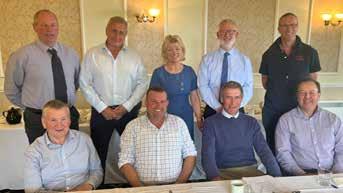
The next workshop is entitled “Performance Management of the CEO” and will be delivered on Thurs 13th November at 12.30 at Inchture Hotel. To book a place, contact jim.booth@saos.coop
In a landmark development for the dairy sector, the four recognised Dairy Producer Organisations (DPOs) have created the first Association of Dairy Producer Organisations (ADPO) in Great Britain. The founding members are the Milk Suppliers Association (MSA) Davidstow Creamery Direct (DCD), MMG Dairy Farmers, and Selkley Vale Milk Group (SVMG).
The ADPO has been established by its members to give a unified voice to farmer members of the DPOs across Great Britain. It will also support other dairy farmers seeking to formalise and professionalise their relationships with milk buyers.
The initiative recognises the growing need for structured, effective and respectful dialogue between farmers and the dairy processing sector, which is essential for addressing shared challenges and delivering key priorities, such as the UK dairy roadmap and greenhouse gas emissions reduction. This pioneering step enhances farmer representation outside
the traditional co-op structures and provides an important platform for producers supplying privately owned or FTSElisted milk buyers, a group that has historically been underrepresented. The ADPO offers a constructive, model for collaboration between farmers and processors – one grounded in transparency, mutual respect, and shared ambition.
The ADPO’s formation builds on a legal framework originally developed under EU legislation, now enshrined in UK law. The organisation was recognised as an Association of Producer Organisations by the Rural Payments Agency in July 2025. Hamish Walls of SAOS has been instrumental in the success of the Milk Suppliers Association and the subsequent foundation of the ADPO. Under the leadership of Rory Christie, Chair of SAOS, the MSA, and now Chair of the ADPO, its establishment represents a tremendous step forward in the long journey toward stronger professional representation for dairy farmers. Both the MSA and the ADPO are grounded in core values of good governance and ensuring long term fair and equitable outcomes for all parties in the supply chain. This milestone is a testament to the dedication of Rory, Hamish, and the founding members of the ADPO; MSA, DCD, Selkley Vale, and Müller farmers, whose commitment and collaboration have brought the members to this historic point.
Davidstow Creamery Direct (DCD)
• Number of members: 272
• Approximate pooled volume: 600 million litres
• Key customer: Saputo Dairy UK
MMG Dairy Farmers
• Number of members: Approximately 1500
• Approximate pooled volume: 3.4 billion litres
• Key customer: Müller Milk & Ingredients

Rory Christie commented: “Professionalising representation for dairy farmers supplying private companies has been a long journey, but launching the ADPO is a significant and positive moment for our industry.”
Max Sealy, SVMG Director, said: “We know that we represent an important sector of dairying in the UK and want to work with others in the industry. We will not replicate good work being done by others. Our focus will be on growing our representation for our current members and offering the opportunity of membership of the ADPO for those Producer Organisations who wish to join us in the future.”
Grant Hartman, MMG Board Chair, added: “Forming an ADPO adds an extra level of governance, and jointly, with other DPO’s provides the opportunity for one voice in support of farmers within the dairy industry, working together for its members.”
Richard Thomas, DCD Board Chair concluded: “Having been the only Dairy Producer Organisation in the UK for many years, we are pleased not only that there are now three others, but that we can formally work together to share best practice and when needed, provide a collective voice for our members.”
Milk Suppliers Association (MSA)
• Number of members: 97 dairy farmers
• Approximate pooled volume: 210 million litres
• Key customer: Lactalis (Stranraer)
Selkley Vale (SVMG)
• Number of members: 80
• Approximate pooled volume: 130 million litres from 2026 to MDLZ, 15 million litres to Wyke Farms
• Key customer: MDLZ and Wyke Farms
Neil McInnes was appointed as General Manager of EoSF at the beginning of June, taking over from Robin Barron.
Neil has spent the last 20 years working for Forfarmers (formerly BOCM Pauls) in a variety of roles, including Commercial Manager, General Manager, Trading Director and Purchasing Manager. Neil started out as a commodity trader with Tate & Lyle (Rumenco) after gaining a BA (Hons) in Business Economics and Marketing at the University of West Scotland. Neil tells us he’s settling in well despite a ‘tricky‘ harvest and has received a very warm welcome from the team and members of EoSF. We wish him well!


Highland Business Services (HBS) Ring Ltd and Ringlink (Scotland) Ltd, have confirmed the formal approval and completion of the proposal to merge the two businesses.
The union marks a major milestone in cooperative support for farming and crofting enterprises, securing the provision of machinery ring services for the long term across a substantial area.
The combined organisation will trade as Ringlink (Scotland) Ltd, bringing together more than 4,000 members and a combined annual turnover in excess of £100 million.
The expanded co-op will continue to serve a vast geography - from North-east and Central Scotland to the Highlands and Islands, including Sutherland, Skye and Argyll - while retaining its local focus and trusted relationships.
• Two directors from HBS join the board of the merged organisation
• Ringlink MD Graham Bruce oversees overall operations

• HBS team continue to manage ops from the Tore office, maintaining local service delivery and knowledge.
Members of both co-ops welcomed the merger, with formal approval of members secured at Special General Meetings.
Robert Logan, SAOS’s Head of Co-op Development, said: “We were pleased to contribute specialist governance support to satisfy suitable engagement with members and complete necessary steps required by their respective Rules and the Act. Such processes can be sensitive and time consuming, but a well-considered plan, strong member engagement, and good working relationships ultimately led to their successful merger.
“This is a landmark development, bringing together two neighbouring Rings that will enhance service delivery across a broader geography, boosting member resilience and operational efficiency. We congratulate both organisations and look forward to their continued success.”

James Porter, Chair of Ringlink, added:
“This merger builds on the shared values and close working relationship between our two organisations. By combining resources, skills, and infrastructure, we’re creating a stronger, more agile and efficient business for our members.”
Anne Rae MacDonald, Chair of HBS, said: “The business has changed markedly over recent times and as a co-op we must evolve to continue to deliver for members.”
The Scottish Machinery Ring Association (SMRA) had a fresh look for this year’s Highland Show, with a revamped stand offering an exciting and contemporary platform to engage members, prospective members and visitors.
Activities over the four days were carefully planned to encourage footfall and demonstrate the vital role Machinery Rings play in supporting agricultural businesses. Visitors learned more about the diverse services offered by Scotland’s Rings, from cost saving solutions and equipment sharing to training and industry connections.
“This is a merger for growth,” said Graham Bruce. “Together, we’ll expand our labour pools, support more rural jobs and help equip Scotland’s agricultural industry with the skills it needs for the future.”
“I’m thrilled the merger is over the line,” said Nina Clancy, Interim Manager at HBS (pictured below, shaking hands with Graham Bruce backed by the rest of the HBS team.)
“Huge thanks go to our members and directors for their backing, and to Graham Bruce and the Ringlink team, who’ve worked tirelessly behind the scenes to make it happen. But above all, credit goes to the HBS staff. Despite a year of major change and uncertainty, they’ve remained committed to putting members first.”

A major highlight was a prize draw to win a new Honda ATV, kindly supplied by Gammies Groundcare in Forfar. All proceeds raised beyond the cost of the ATV were split between RSABI and Farmstrong Scotland, both dedicated to the wellbeing of the agricultural sector.
The draw was conducted by farmer and social media personality Ben Best from Dalscone Farm, who announced Marina Smith from Shetland as the lucky winner. Thanks to the generosity of supporters, along with contributions from Ringlink Scotland, Tarff Valley, Borders Machinery Ring, Tayforth Machinery Ring and Orkney Business Ring, a total of £4,564.92 was raised, which will be divided equally between the two charities.

The RHS also provided the perfect stage to highlight the Machinery Rings’ commitment to nurturing future talent through the Pre-Apprenticeship Programme, which gives young people valuable, hands-on experience in agriculture, opening the door to rewarding careers within the sector.
Visitors to the stand heard from two past Pre-Apprentices, who shared their inspiring stories. One of the students proudly spoke about winning the prestigious ‘Apprentice of the Year’ title at the Lantra ALBAS Awards in 2024, highlighting the impact and opportunities the scheme can offer.
Jim Fairlie, Minister for Agriculture and Connectivity, spoke passionately about the importance of engaging and inspiring young people to consider careers in farming and rural industries. He also praised those who have successfully built careers in agriculture, reinforcing the sector’s need for skilled, committed individuals.

Reflecting on the event, James Playfair-Hannay, SMRA Chairman, expressed pride in their successes; informing visitors of the services offered by the Rings; raising funds for crucial industry charities; and highlighting the next generation of agricultural talent. “Scotland’s agricultural community is built on collaboration, innovation and mutual support, values that are at the heart of the Machinery Rings network,” he said, adding: “The Royal Highland Show gave the Machinery Rings an opportunity to celebrate these values, raise money for vital causes and encourage young people to see agriculture as a dynamic and rewarding career path.”
Ringlink Scotland has recently announced two new roles as part of a period of growth and expansion.
Grant Ireland has been appointed as General Manager to provide both strategic leadership and operational management across Ringlink’s separate divisions of machinery, labour provision and commodity trading.
Grant will be responsible for overseeing key supplier contracts, ensuring best practices are followed for maximum efficiency. While predominantly based at the Laurencekirk headquarters, he will also divide his time among Ringlink’s other regional offices.
Grant brings a wealth of agricultural expertise to Ringlink. He is based outside Huntly and joins from Frontier Agriculture, where he served as Team Leader for the north of Scotland. His background includes Livestock Procurement Manager at McIntosh Donald and over 12 years of hands-on experience working on mixed farms.
Additionally, Ringlink announced the appointment of Melanie Anderson (pictured right) as its new head of human resources.
Following the successful merger with Highland Business Services (HBS), the combined business now boasts a membership of over 4000 and an annual throughput turnover of £100 million. This milestone also marks the expansion of Ringlink’s team to over 50 members and the establishment of a new regional office in Tore.
Melanie, who brings over 20 years of experience as an HR practitioner, will lead a new HR division that will not only support the internal Ringlink business but also provide a range of HR support services to its members.
Managing director Graham Bruce said: “For some time now, the board of directors and I have been considering the introduction of an HR division but like many opportunities over the years, the timing had to be right.



“As a result of the changes introduced by the Employment Rights Bill 2024, this will see a considerable impact for employers, employment agencies and workers. While some issues are minor and others are still under consultation with industry bodies, these changes, along with the recent merger, provide an opportune time for us to introduce this HR service offering comprehensive HR assistance to the membership.”
First Milk recently reported on increased profits and turnover as it benefits from the acquisition of BV Dairy in February 2024.
The co-op saw a 20% increase in turnover year on year to £570 million, which it said was down to the full year effect of BV Dairy and higher sales volumes of milk, whey protein products and specialist chilled products to customers.
This comes with a growth in consumer demand for high quality protein rich and gut health dairy products.
Operating profit increased to £20.5 million from £16.8 million in 2014, with total group capital and reserves at £62.5 million compared to £58.5 million a year earlier.
It maintained its net debt at £66m, fractionally above the previous year’s £64.9m, whilst paying the outstanding loan notes relating to the acquisition of BV Dairy. It made £4.7 million of strategic investments, with the majority, £3.9 million, going into major CAPEX projects at its two cheese producing creameries in the Lake District and Pembrokeshire.
“Add to this the benefits that our restructure brings to our customers, supporting their commercial and ESG agendas, it is a year when we made important progress on adding value to our customers and members and building our resilience.”
It has also made progress on regenerative farming. Land entering First Milk’s regenerative programme increased to 89,977 hectares, up 6%, with progress made in its regenerative programme. There was also an increase in tonnes of CO2e sequestered into the soil on farm by First Milk members of 78% to 203,000 tonnes CO2e.

In the second half of the year, First Milk completed its transition to 100% of purchased electricity from renewable sources and recorded zero waste sent to landfill from its three manufacturing sites.
Shelagh Hancock, First Milk CEO, said: “In a year of subdued economic growth in the UK and across export markets, our solid business performance enabled us to achieve our objective of delivering above market total returns to our members.
“Importantly we achieved this whilst integrating BV Dairy into the First Milk family and paying down the outstanding loan notes related to the acquisition,” she said.

Ms Hancock added: “The leadership our members are showing in implementing their Regenerative Farm Plans is also building greater resilience by improving soil health, restoring nature and protecting ground water and watercourses, alongside increasing the carbon content of their soil through sequestration.
“Ultimately our vision is to enrich daily life to secure the future for our members, colleagues, customers and communities. We will do this by ensuring First Milk is a distinctive, regenerative farmer owned co-op, efficiently producing great tasting, quality dairy products for our customers and consumers.”
Robin Austin has stepped down from his role as Chairman of Tarff following his re-election to the Board at the Annual General Meeting in June. While Robin remains a valued member of the Board, he has now handed over the Chairman’s reins to Andrew Marchant (pictured left). Johnnie Sloan has been appointed as Vice Chair.
Robin has been an integral part of the Board since joining in 1982 and has played a key role in guiding and supporting the business. He took on the position of Chairman in 2008 and led with commitment and dedication throughout his tenure.

At the end of August, the Supply Chain team held the second of the Scotland Food & Drink Business Resilience workshops at the Tarff Valley site in Dumfries. The facilitated workshop gave those taking part the time and space away from day to day business to explore some of the strengths and weaknesses highlighted by the questionnaires that the team completed earlier in the year, and to develop an action plan to address some of the key findings.
As a pilot project, the Supply Chain team was also very grateful for the feedback on the process which has helped finalise the process to roll out to other members, and to the wider food and drink industry in Scotland.

Since the Tarff team completed their questionnaires, the US introduced new tariffs on imported goods which has had a significant impact on supply of key products, and on pricing, and we have also gone through one of the warmest and driest summers ever recorded. With the new questionnaire finalised, the team is looking for more members interested in strengthening their business and supply chain against the turbulent environment we operate in.
If you would be interested in taking part in the next wave of the project, please contact: allene.bruce@saos.coop
Applications are open, until 26th September, for deer stalkers in Scotland’s low ground areas to apply for funding to improve their venison processing facilities. The second phase of the Low Ground Venison Supply Chain Pilot Project, is offering financial assistance for carcass handling facilities, enabling stalkers to cull more lowland deer and increase throughput.
The pilot fund, secured by NatureScot and SAOS, sees SAOS administer the project working closely with Lowland Deer Network Scotland and Scottish Venison.
Promotion for phase two of the Pilot, with a fund of £95k, shares one of the success stories from the initial funding round highlighting the ease of the application process. (Pictured is Mark Seed of Hillside Venison with his new chiller acquired with funding help.)
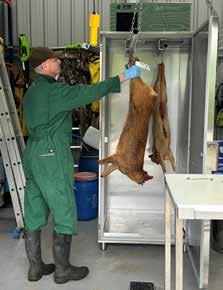
Fourteen applicants were awarded grants in phase 1 of the pilot scheme. These were predominantly for match funding towards new chiller facilities and other larder improvements to facilitate a more professional approach throughout the supply chain. To qualify for help, applications should:
• Demonstrate best practice for carcass handling and the potential to increase throughput.
• Demonstrate a sound business case and how the facility will be sustainably managed for the future.
• Be based and delivered within Lowland Deer Network Scotland (LDNS)’s Scottish operational lowland area, showing no conflicts with other facilities and potential benefits to multiple actors.
• Demonstrate willingness to supply follow-up details on how the facility performs.
Richard Cooke, Chairman of Scottish Venison, commented: “There was a good level of interest in the previous round of this scheme, and we are optimistic that confidence will grow in this initiative to deliver support for low ground deer managers for handling their carcasses. Low ground supply of venison into the food chain has been a challenge that we have recognised in the Scottish Venison strategy and this project, which we welcome, has a key role to play in supporting how we overcome that.”
Pete Moore, from NatureScot’s Wildlife Management Team, said:
“We’ve listened to the views of the deer management sector seeking increased funding for venison supply chains, particularly in low ground parts of Scotland. We hope that this grant will allow more smaller producers of venison in these areas to improve their handling and storage facilities.
“We think it’s a good offer that will help to raise standards and safeguard the supply of venison to the public. We have been at pains to make the application and claim process as simple as possible and look forward to hearing from many more applicants in this round of funding.”
John Bruce, Chairman of Lowland Deer Network Scotland, added:
“I’m really proud that after surveying low ground stalkers and evidencing their need for improving their chillers, that we have worked with partners to be able to run this grant scheme. I hope that many stalkers take up this opportunity.”
The scheme welcomes submissions from stalkers and groups until September 26th, with successful applicants notified by midOctober.
SAOS staff are available to help with applications. Initial enquiries should be directed to venison@saos.coop
Full details of the scheme are on the SAOS website at: https://bit.ly/47pZODu
Continuing our work with the key players across Scotland’s agri-food supply chains, we recently updated our sector supply chain maps and wanted to share again what’s involved in this important piece of work and how we may help you.
• Mapping Supply Chains: We analyse supply chains sector-by-sector to pinpoint critical challenges and opportunities for boosting long-term resilience, sustainability, and profitability. We create full indepth maps, as well as ‘Key Facts and Figures’ summaries.
• Industry Consultation: We engage with industry experts to ensure our supply chain maps accurately represent the real-world, real-time dynamic.
• Ongoing Work: We assess existing initiatives aimed at strengthening sector resilience and sustainability.
• Cross-Sector Insights: We compile and share valuable lessons from across sectors to promote best practice.
• Action Planning: We collaborate with industry stakeholders to develop practical strategies.
Sustainability is at the heart of SAOS’s work and we aim to support sectors in developing supply chains that, not only deliver economic value, but also safeguard environmental and social resources for future generations. We expanded the sustainability section of each map to provide a more comprehensive view of its supply chain impact and activity.
Building on the original assessment of the three pillars of sustainable development - environmental, economic, and social - the maps include information on the carbon footprint and emissions of each supply chain.
• Carbon Footprint Analysis: Detailed breakdowns of CO2e contributions across supply chains.
• Emissions Categories: Emissions are assessed as either Scope 1, 2, or 3 and show the contribution of direct, indirect, and value chain-related activities.
• Key Impact Factors: Insights into elements driving the carbon footprint at every stage of the supply chain.
• Current Activities: A summary of ongoing efforts to reduce emissions and promote sustainability.
• Opportunities for Improvement: Future pathways for supply chains to align with Scotland’s commitment to continuous improvement towards sustainability goals. The insights from this work are crucial for updating the Scotland Food & Drink Partnership and members.
SAOS has developed strong relationships across various sectors and supply chains, building expertise in finding collaborative solutions to complex supply chain challenges. You can view some examples,and the full list of maps available at: https://bit.ly/49Y1xyM
If you’d like copies or to discuss how we can support your supply chain, contact: Patricia.Rojas@saos.coop

Could changes in farming practices reverse the decline of nutrients in our food?
Sustainable nutrition is the intersection between two key drivers in the food industry –healthy planet (sustainable food systems) and healthy people (nutrient dense food).
As a concept, it’s steadily making its way up the agenda for decision makers. As just one example, global multinational Kerry Foods has named Sustainable Nutrition as its megatrend for 2025.
Food today might look as vibrant and abundant as ever, but beneath the surface, something crucial is declining: micronutrients. Over the decades, the essential minerals and vitamins in vegetables and other crops have quietly diminished. Studies conducted around the world reveal that levels of essential minerals such as calcium, iron, and phosphorus in vegetables, such as asparagus and spinach, have dropped significantly since the 1950s. So what’s behind this nutritional erosion?
One theory is the transformation of farming practices. After World War Two, agricultural science introduced high-yield crop varieties alongside synthetic fertilisers and pesticides. While these innovations boosted food production to meet the demands of a growing population, they may have also unintentionally led to diluted nutrient concentrations in crops. Interestingly, soil quality doesn’t appear to be the main factor. One of the longest running agronomic experiments in the world, the Broadbalk Experiment at Rothamsted Research, has been comparing the effect of inorganic fertilisers and organic manures on winter wheat since 1843. It has specifically examined the levels of iron and zinc in wheat grown under different farming methods and found that, while the soil remained nutrient-rich, the wheat itself became less nutritious over time. This suggests that shifts in plant varieties - such as semi-dwarf wheat - may play a significant role in declining nutrient levels.
The implications of this change may be profound. As our food loses its nutritional density, we might be consuming more calories but fewer essential nutrients, meaning that the phenomenon of an obese yet malnourished population, which can already be seen in some populations, may become more common.
This raises critical questions about how we can reverse the trend. Can a move towards regenerative agricultural techniques restore lost nutrients? Can farmers be rewarded not just for yield, but the nutritional quality of the food they produce? While the research community investigates solutions, one thing is clear - a holistic understanding of where our food comes from, and how it is grown, is more important than ever.
As part of our Sourcing for Growth work, we’ve created a new area on our website to simplify the process of helping buyers and sellers meet their perfect match. Just input a few details to let us know what you’re looking for, or what you can offer, and we can start work on finding a match and helping you build new relationships with other businesses in the supply chain who offer complementary inputs and shared objectives.
Sourcing for Growth connects food manufacturers with local producers of high-quality Scottish produce - and we can also help develop relationships with service providers, such as contract packers, to help businesses grow and build resilience.
We came up with a similar initiative many years ago, and had some pretty impressive successes the first time around. One of the partnerships we helped put together was Mackies and Taypack for their joint venture producing crisps (pictured right!)
The fact that we currently import around 40% of our food and drink, with many of these goods able to be produced here in Scotland, just doesn’t make sense to us, so trying to match up buyers and sellers closer to home seems obvious! There are so many positives to shortening supply chains. Not only will this help enhance our food security and resilience, but it also holds great potential for new markets and partnership opportunities. Other benefits include:
• Reducing reliance on imported goods and increasing the sourcing of locally-produced food
• Mitigating risk through reduced exposure to international market fluctuations
• Lowering environmental impact and carbon footprint through shorter supply chains and decreased transportation needs
• Enhancing overall business resilience and security
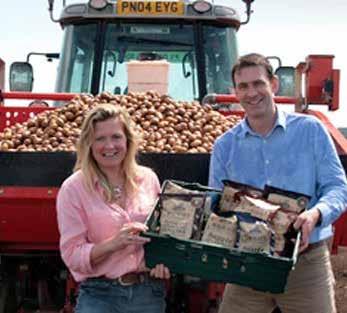

• Building robust local networks, ensuring a steady supply of goods and business continuity
• Leveraging the appeal of Scottish-sourced and Scottish-branded products
We have a varied and growing list of ‘current opportunities’ - from Buttermilk to Quinoa! - on our website, check them out online and if there’s something you have to sell, or want to buy, get in touch and we’ll do our utmost to help - we’re pretty good at this kind of thing!
Fill out a simple form to give more details and we’ll start your search, go to: https://bit.ly/4ewb1Tq
Sourcing for Growth is a key element of the Scotland Food & Drink Partnership delivery programme.

September is once again time to celebrate Scotland’s world-class food and drink, and shine a spotlight on the people, products and producers forming a cornerstone of Scotland’s economy, culture and identity.
This year’s theme is innovation and we’re delighted to see Growers Garden feature as part of the promotion.
Formed in 2019 as a new venture by 16 families attached to our member co-op, East of Scotland Growers, the business has now expanded across Scotland as more growers recognise the value of working together to tackle food waste - turning ‘wonky’ or surplus vegetables into high-quality snacks promoting sustainability and healthy eating.
Since launching, Growers Garden has invested £2 million in its own extrusion facility in Cupar – a unique innovation allowing fresh, wet vegetables to be processed directly into crisps, something conventional factories couldn’t offer. By pooling resources, the farmer-led collective has achieved what would be beyond the reach of individual producers, saving
over 41 tonnes of food from landfill and crafting products now available in 350 stockists across the UK.
This spirit of innovation is echoed right across Scotland’s food and drink sector. Worth around £15 billion to the economy, the industry is one of the nation’s largest employers, supporting more than 129,000 jobs across agriculture, fishing, aquaculture and manufacturing in both rural and urban communities. It contributes nearly £5.4 billion in Gross Value Added (GVA) and accounts for almost 29% of Scotland’s total manufacturing turnover.
Great reasons to celebrate!


At SAOS, we’re always interested to see innovation in food and drink and, in particular, unusual products from farm businesses, both in the UK and overseas. Some provide inspiration, others indicate trends developing, and/or potential new market opportunities, but they all serve to remind us just how creative and diverse rural businesses are. We’re delighted to have an exciting Scottish innovation to share in the list this time!
The Wasabi Company, a family-run business based in Dorset and Hampshire, was the first in Europe to grow fresh wasabi. Using traditional Japanese methods adapted to UK conditions, the company evolved from a former watercress farm. Producing a wide range of Japanese ingredients and condiments using fresh wasabi grown on-site, the products are available online and through select retailers and restaurants, the company has won multiple Great Taste Awards.

Why It’s Different: The only UK grower of fresh wasabi, a notoriously difficult plant to cultivate, using spring water and shaded beds to replicate Japanese growing conditions. Their range ffers a premium, authentic alternative with real wasabi, not horseradish substitute.
Hexafly is a biotech start-up founded in 2015 in Navan, Ireland. The company uses Black Soldier Fly larvae to upcycle food and brewing waste into sustainable products including protein meals, insect oil, organic fertiliser, and chitin. Their production model is rooted in the circular economy, aiming to reduce reliance on traditional protein sources and mitigate environmental impact.
Why it’s different: It uses insect farming to produce high-value, sustainable alternatives to soy and fishmeal, converting food and brewing waste into useful products for aquaculture, pet food, agriculture, and oleochemicals.
• The products are hypoallergenic, rich in Omega 3, calcium, and antimicrobial lauric acid.

• Hexafly operates with a low environmental footprint and aligns with clean tech and agtech principles.
• Aims to decarbonize feed production and reduce competition with human food sources, and the “One Farm, One Herd” strapline taps into consumer interest in provenance, artisanal and minimally-processed products.

A grower-led association based in Canterbury, South Island, the New Zealand Blackcurrant Co-operative, manages the entire supply chain for New Zealand’s blackcurrant industry - from cultivation to processing and global sales. Members of the co-op are blackcurrant growers who benefit from shared expertise and co-ordinated marketing. The co-op transforms freshly harvested berries into a variety of formats including juice concentrate, individually quick frozen (IQF) berries, puree, and dried powders, which are then sold to manufacturers worldwide.
Why it’s different: Located in regions ideal for growing nutrient-rich blackcurrants, the growers’ co-op invests in scientific research to validate health benefits of blackcurrants and focuses on functional food applications, with research showing benefits for cardiac health, exercise recovery, and mental alertness.
It supports sustainable agriculture and collaborative farming through its co-operative model.
Farms - Scottish-grown vanilla for food, fragrance, and flavouring
Aberdeenshire-based, agritech start-up Vanilla Farms is the first to grow and cure vanilla in Scotland, using proprietary technology and sustainable farming methods. Beginning on-farm, the business has become the first tenant of ONE SeedPod, Scotland’s food and drink innovation hub. Vanilla Farms won £150,000 in Scottish EDGE Round 25, highlighting its potential to disrupt the global vanilla supply chain.

Why it’s different: Scotland’s first vanilla harvest, grown using controlled environment agriculture and regenerative practices, offers a traceable, terroir-driven vanilla alternative to imported beans, with consistent quality and ethical sourcing. The entire process, from cultivation to curing, is done in Scotland.
Vanilla is used in premium food, beverage, and fragrance applications. Combining scientific precision with local farming expertise, Vanilla Farms have created a new category of Scottish-grown luxury ingredients, at the same time reducing reliance on carbonintensive vanilla imports, improving self-sufficiency and promoting ethical sourcing and agricultural diversification in Scotland.

If you’ve any suggestions for future SAOS Updates, or you no longer wish to receive it, please contact: jennifer.thompson@saos.coop